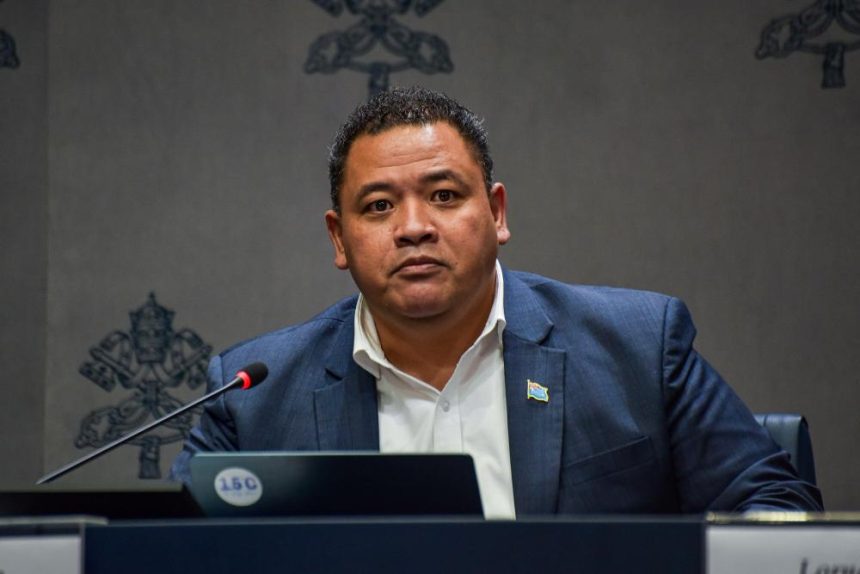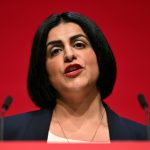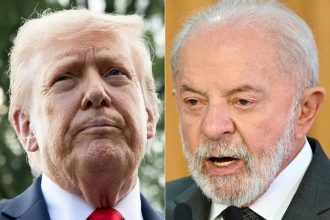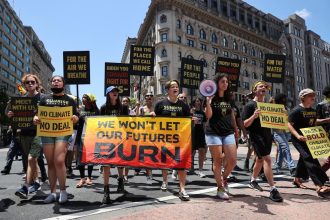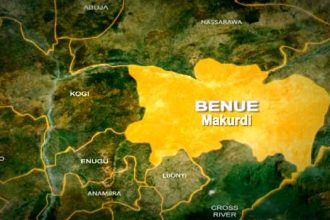Of all the representatives from 193 countries present at the crucial UN climate talks in Belém, Brazil, only one has summoned the courage to take the stage and publicly denounce the absent and hostile Trump administration: the climate minister of tiny Tuvalu.
On Monday, Maina Vakafua Talia told leaders and diplomats at the Cop30 summit that Donald Trump had shown a “shameful disregard for the rest of the world” by withdrawing the US from the Paris climate agreement.
At a gathering where Trump has loomed large despite refusing to send a US delegation, Talia’s public rebuke is in stark contrast to mostly private murmurings from delegations aghast at attempts by the US to halt climate action but wary of potential retribution from the White House.
“We can’t remain silent while our islands are sinking. We can’t remain silent while our people are suffering,” Talia said. Tuvalu is a nation of atolls and reef islands in the south Pacific and is considered acutely vulnerable to sea level rise and fiercer storms caused by the climate crisis.
“The US has withdrawn from the Paris climate agreement, and I think that’s a shameful thing to do,” he said. “We look to the US for options, for peace, but it seems they are going in the opposite direction and we should hold them accountable. Just because the US is a bigger country doesn’t mean we have to be silent. What matters to us is our survival.”
Trump himself has made clear his disdain for the climate crisis, calling it a “con job” and a “hoax” while axing environmental rules and clean energy projects in the US and urging other countries to remain dependent on fossil fuels. “If you don’t get away from this green scam, your country is going to fail,” the US president told leaders at a UN speech in September.
“You need strong borders and traditional energy sources if you are going to be great again … All of these predictions made by the UN, often for bad reasons, are wrong. They were made by stupid people.”
Last month in London, the US made a muscular intervention to stymie a plan to reduce international shipping emissions, reportedly threatening other countries’ diplomats during coffee breaks at the International Maritime Organization (IMO) to get its way. Although there are no US delegates – for the first time – at the current UN climate talks, some negotiators are nervous of a possible repeat.
“I think countries are afraid of speaking up because if they step out of line, especially smaller countries, vulnerable countries, you never know when the next erratic increase in tariffs will come,” said Farhana Yamin, a British lawyer and activist who was a key architect of the Paris climate deal.
“Countries have seen aid cut by the US and they don’t have the means to fight back. So probably there’s a sense of self-censorship that is imposed.”
Yamin added that Trump cannot completely halt the global shift to cleaner energy but countries are still facing a “powerful, very vitriolic, very scary actually at times, backlash”.
Gavin Newsom, California’s governor, visited Cop30 and called Trump an “invasive species” and a “wrecking ball”, but non-Americans here are more circumspect. Several delegates approached for comment about the US’s position on climate at Cop30 either demurred or expressed neutral, diplomatic responses.
“I think the American people made a democratic decision,” said Juan Carlos Monterrey, Panama’s climate negotiator. “So they’re sovereign, right? And that needs to be respected.”
But in private, some negotiators admitted to treading carefully to avoid a negative reaction from Trump. “Please don’t make out I’ve said anything about the US, I don’t want them to invade my country or anything,” said one.
Tuvalu’s Talia does not hold such anxieties, pointing out the Trump administration has already cut climate-adaption funding for his island nation. He said that he watched Trump’s speech to the UN in September and found it “entertaining”.
“The president is imposing sanctions, levies – for us, we have nothing to trade with the US,” he said. “This is a moral crisis. He has a moral duty to act, the world is looking at him, looking at the US.
“We listen to the president of the United States. We looked to find hopes and options but what we got was doom. It was condemning us and our ability to survive. We need the US in the equation. We need them to engage.”
The Trump administration is treating multilateral politics like “two- and three-year-olds” who cause a ruckus while “playing house”, Christiana Figueres, the former UN climate chief, said. “It is completely immature, irresponsible and very sad for the United States,” she said.
Figueres has said that it is better for the US not to be present at Cop30, rather than be here and upend the process, although some sort of Trumpist intervention could still occur in the second week of the summit as an agreement nears. Countries will be discussing issues such as climate finance and a phase-out of fossil fuels that the US, or aligned allies such as Saudi Arabia, could seek to block.
Related: California governor calls Trump ‘an invasive species’ at Cop30 climate talks
“They don’t even need to be in the negotiations,” said Susana Muhamad, former environment minister of Colombia, of the US. “If there is an outcome that will affect their interests, they will react. And they have the power to react, as they show in the IMO [maritime] process.”
Asked whether the US can build back its declining reputation on the global stage, the Rhode Island senator Sheldon Whitehouse, the only US federal official at Cop30, said that will require Americans to wake up to the reality that Trump’s fossil fuel policies are fueling an affordability crisis. The president’s attacks on needed clean energy are sparking a rise in utility bills, he said, while climate-driven extreme weather is pushing up home insurance rates.
“The quicker that becomes clear to Americans and the quicker the complicity of the Republican party in that becomes clear to Americans, the quicker we’ll make the political correction so that we no longer have a government we have to apologize for,” he said.


